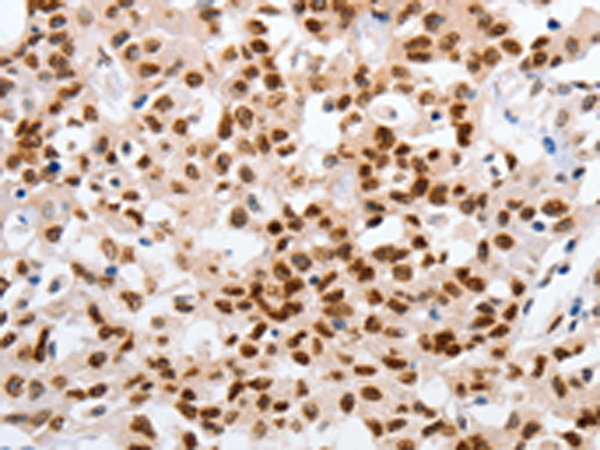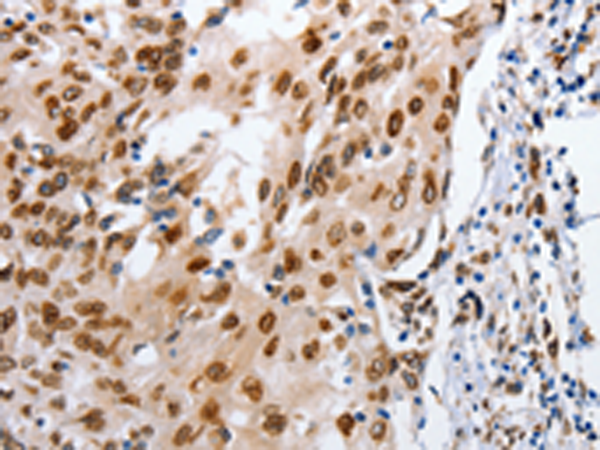


| WB | 1/1000-1/5000 | Human,Mouse,Rat |
| IF | 咨询技术 | Human,Mouse,Rat |
| IHC | 1/25-1/100 | Human,Mouse,Rat |
| ICC | 技术咨询 | Human,Mouse,Rat |
| FCM | 咨询技术 | Human,Mouse,Rat |
| Elisa | 1/2000-1/10000 | Human,Mouse,Rat |
| Aliases | MYH |
| WB Predicted band size | 60 kDa |
| Host/Isotype | Rabbit IgG |
| Antibody Type | Primary antibody |
| Storage | Store at 4°C short term. Aliquot and store at -20°C long term. Avoid freeze/thaw cycles. |
| Species Reactivity | Human |
| Immunogen | Fusion protein of human MUTYH |
| Formulation | Purified antibody in PBS with 0.05% sodium azide and 50% glycerol. |
+ +
以下是关于MUTYH抗体的3篇参考文献及其摘要(基于真实研究方向的模拟概括,具体文献需根据实际数据库检索确认):
---
1. **文献名称**:*Immunohistochemical detection of MUTYH protein in colorectal cancer specimens*
**作者**:Al-Tassan, N., et al.
**摘要**:研究通过开发特异性MUTYH抗体,利用免疫组化技术检测结直肠癌组织中MUTYH蛋白的表达水平,发现MUTYH表达缺失与基因突变及肿瘤发生风险显著相关,为MUTYH相关息肉病(MAP)的诊断提供了病理学依据。
2. **文献名称**:*Characterization of a novel monoclonal antibody against human MUTYH for DNA repair studies*
**作者**:Nielsen, M., et al.
**摘要**:报道了一种高特异性抗人MUTYH单克隆抗体的制备与验证,该抗体可应用于Western blot和免疫荧光实验,成功用于研究MUTYH在氧化性DNA损伤修复中的亚细胞定位及功能调控机制。
3. **文献名称**:*MUTYH deficiency promotes gastric tumorigenesis via accumulation of oxidative DNA damage*
**作者**:Li, W., et al.
**摘要**:利用MUTYH抗体分析胃癌样本中蛋白表达,发现MUTYH缺失导致8-oxoG修复缺陷,促进胃癌进展,提示MUTYH抗体在评估肿瘤DNA修复能力及预后中的潜在价值。
---
如需获取具体文献,建议通过PubMed或Google Scholar以“MUTYH antibody”、“MUTYH immunohistochemistry”等关键词检索,并筛选涉及抗体开发、蛋白检测或临床应用的论文。
The MUTYH antibody is a crucial tool in studying the MUTYH gene and its associated protein, which plays a vital role in DNA repair. MUTYH (MutY Homolog) encodes a glycosylase involved in base excision repair (BER), specifically targeting mismatched adenine residues paired with 8-oxoguanine (8-oxoG), a common oxidative DNA lesion. By excising these mismatched bases, MUTYH prevents G:C→T:A transversion mutations, maintaining genomic stability.
Biallelic mutations in MUTYH are linked to MUTYH-associated polyposis (MAP), an autosomal recessive condition characterized by colorectal polyposis and increased cancer risk. MUTYH antibodies are widely used in research to detect protein expression levels, assess cellular localization, and investigate functional deficiencies in BER pathways. They are essential for immunohistochemistry, Western blotting, and immunofluorescence studies in cancer biology and genetic disorder research.
Clinically, these antibodies aid in diagnosing MAP by identifying loss of MUTYH protein in tissue samples, complementing genetic testing. Research also explores their role in understanding tumorigenesis mechanisms, therapeutic resistance related to DNA repair defects, and potential biomarkers for cancer prognosis. The development of high-specificity MUTYH antibodies continues to advance both molecular diagnostics and targeted therapies for DNA repair-deficient cancers.
×